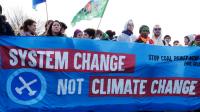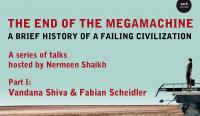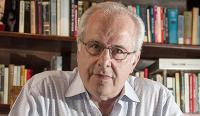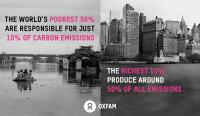In this video, world-renowned linguist and dissident Noam Chomsky speaks with Fabian Scheidler, author of the book “The End of the Megamachine. A Brief History of a Failing Civilization”. The conversation, moderated by Nermeen Shaikh, focuses on the destructive forces that are threatening human survival and the future of life on earth.
The topics include: state violence, from its inception in antiquity to our days; structural violence and property relations in early history and today; ideological power and the media; the “tyranny of linear thinking” and the destruction of the biosphere; the need for a new internationalism that can overcome the nation state system and borders; US attempts to destroy internationalism (WHO, Paris climate agreement, Iran nuclear deal); the US facing a possible civil war; the misconstruction of the European Union, the neoliberal plague and the rise of the “reactionary international”; the climate crisis and climate refugees; the convergence of social movements and prospects for a post-capitalist world.
Noam Chomsky, linguist and author of more than 100 books, University of Arizona
Fabian Scheidler, co-founder of Kontext TV, author of "The End of the Megamachine. A Brief History of a Failing Civilization"
Moderated by Nermeen Shaikh, co-host of Democracynow
Timeline and topics:
0’14”: Nermeen Shaikh: Introduction.
Fabian Scheidler:
2’05: The crisis of life on Earth. Demystifying the history of states, “civilization” and modernity/capitalism.
3’20: Formation of states and “civilization” 5000 years ago in Mesopotamia. Surge of violence due to militarization and land privatization
5’20 The Four Tyrannies: physical power; structural violence (e.g. property relations); ideological power; “The Tyranny of Linear Thinking”.
Noam Chomsky:
10’00: Pre-state phase of human existence was less violent than life in state systems.
11’05: Europe the most violent place in the world for the last 1000 years until 1945, due to warring states.
13’50: Imposed state structures in the Middle East and Africa.
14’35: Erosion of state system and borders necessary in the face of global crises: pandemics, global warming, the threat of nuclear war demand internationalism.
15’55: US state-building: endless wars since 1783.
16’20: American Revolution and war of extermination against Native Americans
18’25: The thousand years’ war of European states against the Muslim world, brutal imposition of nation states.
19’25: New internationalism. Covid-19 vaccines needed for everyone.
21’00: US destroys internationalism: WHO / Cofex. Paris climate agreement. Iran agreement.
Nermeen Shaikh:
24’00: Crumbling of the nation state system in the US, the EU?
Noam Chomsky:
24’25: US face possible civil war and breakdown. War games for the case that Trump loses the election.
28’35: EU, reasons for its failure: economic system run by unelected bodies (European commission, IMF, ECB). Neoliberal plague. Anger, bitterness, ascent of demagogues.
31’40: Root causes for Brexit: de-industrialisation of Britain
33’00: Progressive international: Bernie Sanders movement plus Diem25.
33’55: International class war. Reactionary international based in the White House.
34’10: Agreements between Israel and Arab dictatorships: forging a reactionary international in the Middle East.
35’50: Progressive international: struggle about post-pandemic world.
36’50: US constitution: James Madison: government “to protect the minority of the opulent against the majority”
Fabian Scheidler:
39’10: Response to Chomsky. Climate refugees key topic for progressive internationalism.
40’05: The myths of modernity: torture, inquisition, witch hunts reached climax not in the “dark” Middle Ages but in modernity. Slavery and genocides as “monsters of modernity”.
41’00: War, militarization and the emergence of capitalism. Private capital and states.
44’10: Corporations enforcing endless expansion.
45’25: Capitalism based on monopolies, not free markets.
46’55: The corporate nanny state. Subsidies and bail-outs: fossil fuel industry, Wall Street, car industry, aviation industry. Taxpayers financing the industries that destroy the planet.
48’55: Transformation of the state: money for decentralized economic institutions that work for the common good. Cooperatives.
Noam Chomsky:
51’05: State capitalism and corporations.
52’10: The neoliberal plague.
54’55: After WW II: Egalitarian growth, no financial crises, no tax havens. Different varieties of state capitalism.
56’05: Climate change: “With 3 or 4 degrees centigrade warming, we are probably finished.”
56’35: Different time scales for stopping climate havoc and overcoming capitalism.
57’20: Green New Deal proposals: Congress version. Proposal by Robert Pollin.
58’40: Government should buy up fossil fuel industry, hand it over to the workforce, shift to renewables: “Perfectly feasible tomorrow.”
1h 00’ 00”: Capitalism to be overcome in the long run, by self-managed industries, cooperatives, localism.
1h 01’ 15”: “Refugee crisis” a “moral crisis of the West”.
Noam Chomsky:
1h 02’ 33”: Climate crisis as an international class struggle. Fridays for Future / Greta Thunberg, indigenous people, first nations.
1h 04’ 30” Green New Deal. Sunrise Movement. AOC.
1h 05’ 25” Democratic Party: Biden climate proposal killed by Clintonites/DNC.
Fabian Scheidler:
1h 10’ 00”: Climate/energy transition. Car industry. Living better with less production.
1h 12’ 30”: Ecological class struggle: taking away the resources from the richest 20 % and redistributing it.
1h 13’ 20”: Social movements: getting prepared for future crises. Convergence of Sanders movement, Black Lives Matter, climate movement.
In view of the unprecedented threat to life on Earth posed by climate chaos, species extinction and nuclear weapons, Fabian Scheidler argues that it is necessary to demystify the history of Western civilization in order to expose the destructive structures that are responsible for the global crises. These myths also include the narrative that states came into being in order to put a stop to the human predisposition to violence. In fact, history shows a rapid escalation of violence, war, exploitation and the destruction of nature with the emergence of the first states 5,000 years ago. At the root of systems of domination, whether in early Mesopotamia or modern capitalism, are the "four tyrannies": physical power, especially in the form of militarized states; structural violence, which is expressed, among other things, in unequal property relations; ideological power, which presents such orders as natural; and finally the "tyranny of linear thinking", which is based on the idea that man and nature can be controlled and dominated according to the pattern of command and obedience. However, according to Fabian Scheidler, all living systems are based on complex cyclical processes, and the idea of controlling nature is therefore a dangerous error.
According to Noam Chomsky, modern nation states have left behind a trail of violence since their foundation, which ultimately led to the two world wars. By imposing nation-state structures on the colonies, the European powers set in motion a seemingly endless chain of wars and conflicts. This also applies to the USA, which, according to Chomsky, "is one of the few countries in the world that has probably never had peace for a single year." The founding of the USA was based on a long war of extermination against the indigenous population. Added to this is the almost thousand-year war that the Global North has waged against the predominantly Muslim South. In order to counter current global threats such as climate change, pandemics and war, nation-state structures need to be overcome in favor of comprehensive internationalism. Despite all its shortcomings, the EU is a step in the right direction to make borders more permeable. However, internationalism is repeatedly torpedoed by the USA in particular, whether through the withdrawal from the nuclear agreement with Iran, the patenting of vaccines or the undermining of climate agreements.
According to Fabian Scheidler, the issue of climate refugees is another example of the urgency of a new internationalism, which Noam Chomsky spoke about. As far as the modern state is concerned, it has developed "co-evolutionarily" with the institutions of capital accumulation since the 16th century and set in motion the most aggressive system in human history. While the "myth of modernity" claims that the modern era liberated people from the "Dark Ages", in fact the climaxes of torture, inquisition, witch hunts, slavery and colonial genocides occurred during the period of capitalism's emergence, as did an unprecedented militarization. Merchants and banks lent money to states to pay for firearms and mercenaries, which the rulers used to raid and plunder other countries and pay the "return on investment" to the lenders. The state also granted the merchants monopolies in return for credit. State and capital were thus inextricably intertwined from the outset. The next step was the establishment of colonial joint-stock companies – the models for modern corporations –, which legalized these structures of violent expansion and formed economic machines that could not exist without endless growth. Today, the 500 largest corporations in the world, which account for two thirds of global trade, are artificially kept alive by states through subsidies worth trillions of dollars. According to the IMF, the fossil fuel industry is subsidized by 5900 billion dollars per year. In order to avoid a planetary disaster caused by these structures, state and capital must be separated and the taxpayer's money channeled into a socio-ecological transformation.
According to Noam Chomsky, the state basically dictates the structure of the market. Corporations also receive privileged rights from the state. However, the neoliberal turnaround has profoundly changed these structures. Since the 1980s, around 1000 billion dollars have been stolen from the working and middle classes every year through changes in tax and corporate law. State capitalism can take on very different forms. As the climate crisis must be solved in the next ten to twenty years, this is only possible within the framework of a reformed state capitalism. However, a fundamental system change remains necessary, but requires more time. Chomsky advocates an ambitious Green New Deal, as he outlined with Robert Pollin in the book of the same name. "If we reach a warming of 3 or 4 degrees Celsius, we are probably finished. No organized human life will survive at that level." Governments should buy up the oil, gas and coal industries, hand them over to the workforce and switch to renewable energies: "That is perfectly feasible tomorrow". However, even Joe Biden's inadequate Green New Deal plan was overturned by the Clinton wing of the Democratic Party. The climate crisis is a class conflict of "colossal proportions" and the climate movement is facing enormous challenges. The fight should not be left to young people and indigenous communities alone; people with power and prestige must join in.
In order to maintain a chance of limiting global warming to two degrees, industrialized nations must reduce their emissions by 80 percent by 2030. However, according to Fabian Scheidler, this is only realistic if, in addition to switching to renewable energies, overproduction and overconsumption are reduced, especially among the wealthy classes. In the transport sector, for example, a drastic reduction in traffic is needed through public transport and other settlement structures. The aim is to create a progressive vision for a better life in which needs such as mobility are met with much less material and energy input. The climate crisis is not the only threat to life on Earth; the extinction of species is just as dangerous. This is another reason why overproduction must be overcome. As poorer people are barely able to limit their consumption, it is necessary to take resources from the top 20 percent, who are responsible for 80 percent of environmental consumption, and redistribute them. This requires a convergence of ecological and social movements that work together to prepare for future crises.
Nation-state structures are disintegrating in many parts of the world. According to Noam Chomsky, the USA could be on the brink of a possible civil war - a scenario that almost came true with the storming of the Capitol in January 2021. High-ranking military officials are already planning war games for this eventuality. At the same time, the EU is disintegrating due to the "neoliberal plague" and its internal weaknesses, in particular the anti-democratic construction of the "Troika", which has imposed crushing austerity programs on the populations, leading to anger, resentment and the rise of right-wing demagogues. A "reactionary international" is forming, including Donald Trump, Bolsonaro's Brazil, Eastern European leaders such as Orban, the Gulf dictatorships, right-wing Israel and Modi's India. In contrast, a progressive international is fighting for a different world after the pandemic.











